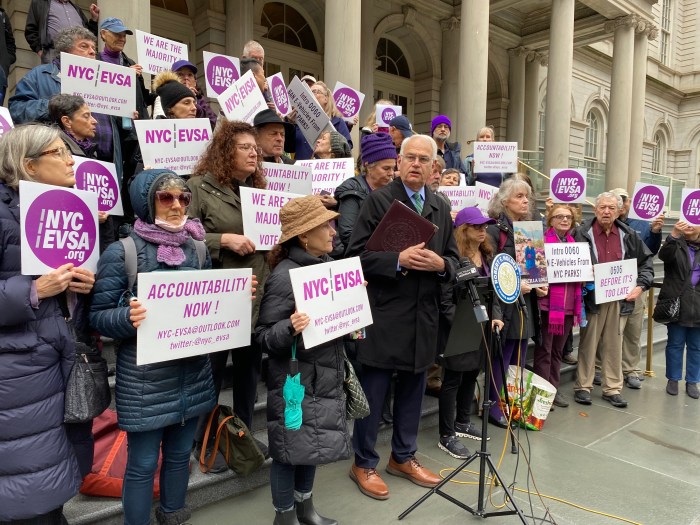Sens. Chuck Schumer and Cory Booker will introduce legislation Thursday that would require all train and commercial vehicle operators be tested for sleep disorders, such as sleep apnea. The announcement comes just a day before the anniversary of the Hoboken train crash that killed a 33-year-old woman and injured more than 100 people.
“It is outrageous that we don’t test,” Schumer said about federal standards, adding “it doesn’t take an Albert Einstein to figure out” that testing is necessary.
On Sept. 29, 2016, an NJ Transit train failed to stop at the end of the tracks in Hoboken killing a woman who was crushed under falling debris while waiting on the platform. At Atlantic Terminal in January, more than 100 people were injured after a train traveling over the speed limit hit the bumping block at the end of its track in the Brooklyn transit hub.
Last week, federal investigators determined engineers in both crashes suffered from obstructive sleep apnea. The National Transportation Safety Board said last week it was combining the investigations into the crashes.
And in 2013, four people were killed when a Metro North train derailed in the Bronx after the engineer, who also was found to suffer from obstructive sleep apnea, fell asleep.
In August, the Federal Railroad Administration and the Federal Motor Carrier Safety Administration put the brakes on an Obama-era proposed rule that would have required operators be tested regularly for the sleep disorder, citing current programs and rules already in place as “the appropriate avenues” to address the issue.
Sleep apnea sufferers start and stop breathing when they sleep as their throat muscles relax and block their windpipes. If left untreated, the disorder causes reduced alertness and can leave people prone to falling asleep involuntarily.
“For this administration to remove the testing at a time when we have such evidence is outrageous,” Schumer said, adding: “I am going to do everything I can to pass legislation.”
Under Schumer and Booker’s proposal, the FRA and the FMCSA would oversee the rules for testing, with individual agencies conducting the tests.
Under the bill, Schumer said testing would happen when an engineer is first hired and then again every five years.
Nancy Snyder, a spokeswoman for NJ Transit, said the agency implemented a new policy in October 2016 that would immediately remove any safety-sensitive rail employees from service who exhibit fatigue symptoms. The agency, she said, has been testing for sleep apnea since 2005.
“We test and we will continue to test,” Snyder said.
By the end of September, she added, all locomotive engineers will have been tested as well.
Following the Brooklyn crash, the MTA said it was expanding sleep-apnea screenings for all employees responsible for moving trains and buses through its network.
“Safety is the MTA’s number one priority,” said Aaron Donovan, an MTA spokesman. “Our sleep apnea screening program is the most aggressive in the nation and is moving forward with or without legislation.”
































